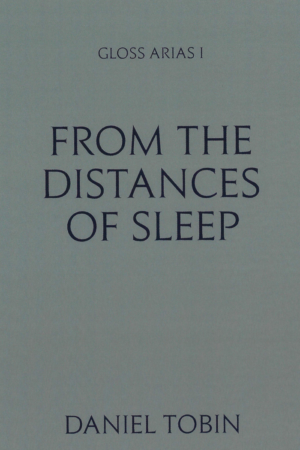From the Distances of Sleep
by Daniel Tobin
reviewed by Michael McGillicuddy
From the Distances of Sleep, the first of Daniel Tobin’s Gloss Arias trilogy, opens with Tobin’s translation of a poem by Italian poet Giuseppe Ungaretti, “Matina”:
I am what illumines me—
scintilla of immensity.
The poems in From the Distances of Sleep offer the reader a masterful disclosure of the light holding together the particular and universal. “Mattina” (Italian for “morning”) heralds the light but how do Tobin’s poems illumine the relation “Matina” announces? “First Light,” an early poem in the chapbook, shows the reader clearly.
There is no such thing as dark.
It’s just your eyes are blinkered
out of being parsed by being
kin to tree huggers and shrews:
good news. Now somebody
needs to go tell the screech owl.
Why has “being parsed being?” We can’t say, but we can say that being parses itself into beings for its own shining forth. Being’s work of parsing itself into us, into “tree huggers and shrews,” is “good news” because each of these beings is a scintilla of being, shining through in an illumined presence. “There is no such thing as dark,” the poem says; there is light and more light. In the final stanza of the poem, we are told “to go tell the screech owl” the poem’s revelation. The night orienting the owl’s life is illusory, for only the brilliance of the day exists. Yet in going to tell the screech owl, aren’t we delivered back over to the night, interval between the light of day? So “First Light” doesn’t resolve so simply in the splendor of light. Rather, it gives us over to a darkness that poetic language apparently works tirelessly to illumine. We see the light; we must hear the word. The auditory stakes are returned to in “Kettle Boiling”:
Before you know, there is
rumbling, as when
a train is far off, then
the chug, chug grows
wilder until everything happens
at once and water
screams through the tunnel
of its absence.
The poem pushes up against the limits of time and presence insofar as “everything happens / at once.” The poem’s image is simultaneously “kettle” and “train”—“rumbling” holding together “kettle” and “train” analogously, “kettle” and “train” pointing back, as if to their origin, to “rumbling.” The relation between “kettle” and “train,” then, rests on hearing: on the rumbling that becomes sonically “wilder until everything happens / at once.” “Kettle Boiling” finds, in the banal act of heating a kettle, a moment where “everything” coalesces: time into eternity, presence into infinity.
For Tobin, the task of the poet lies in illumining the totality of time and space through the poetic telling of the event—a telling which, as “Kettle Boiling” shows, just as quickly silences itself when it attempts to reach the deafening pitch of “everything” “at once.” Not a failure of poetic speech, but a poetic speech which has apprehended the potency of silence—of the interval. Running up against a limit, intimating the unlimited, the interval intimated by “Kettle Boiling” becomes, paradoxically, the perfect analog to the clear opacity of the kettle boiling: an identification of opposites that analogously suggests the identification of scintilla and immensity.
Finding the immense through the scintilla is further explored in the composition of the poems themselves. The longest poems in the book, “Coroner” and “Walnuts,” are only twelve lines long. But a laborious construction is not needed to intimate that immensity from which the mere scintilla is derived—even the humble egg cup “holds the morning / in its bowl,” it holds time (morning) and space (its bowl). Here is “The Egg Cup”:
……….The shape it makes in air
………..light playing off the lip
………….holds the morning
………………in its bowl—
……………..,,little urn
………………,,,llittle
…………………chalice
………………..adorned
……………..with a spray
……………of cornflowers.
Striving toward immensity, Tobin nonetheless interrupts himself with a hyphen. This interval brings us back to the “little urn / little / chalice.” Tobin accentuates the meagerness of the cup while associating it with immensity: “urn” suggesting the immensity of death, “chalice” suggesting the immensity of God. Scintillas intimating immensity. That’s what the poems do, and that’s what they are: they must be brief.
Tobin’s poems are sonic meditations on the threshold of being—light and darkness, utterance and interval, presence and absence. Formally compressed and deceptively simple, the poetry invites us to marvel at the magnificent mystery of immensity by beautifully delimiting every and any scintilla: owl, kettle, cup—speech, silence.
Published on June 9, 2025

